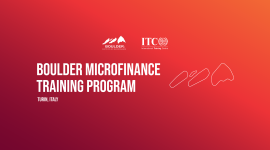Making Finance Work for refugees, displaced, and host communities

Making Finance Work for refugees, displaced, and host communities
11–15 May 2026
Introduction to the course
The world is witnessing the highest levels of displacement on record. The number of forcibly displaced populations is growing every year, with prolonged displacements becoming more common. To address this challenge, it is crucial to focus on long-term, sustainable solutions that support dignified, inclusive, and comprehensive programs for refugees, displaced individuals, and host communities. Various actors from the humanitarian and development sectors are increasingly engaging in these efforts.
Who attends this course?
This international edition of the course is designed for a wide audience, including development practitioners, finance professionals, policymakers, and other public or private sector actors. The course equips you with knowledge of financial sector experiences, actions, and products for refugees, displaced individuals, and host communities. It takes a unique approach to explore how financial service providers can strategically and cost-effectively support these groups. The course is useful for: - Financial service providers (FSPs - banks, microfinance institutions, credit and saving cooperatives, money transfer agencies, insurance providers and other FSPs) - Providers of technical assistance to FSPs, investment and funding agencies - FSPs national and regional networks, microfinance associations, apexes and federations of credit and saving cooperatives - Government agencies and regulators of the financial sector - Development and humanitarian practitioners and donors - Agencies supporting refugees, displaced and host communities with non-financial services - Other actors supporting financial inclusion and diversification efforts
Why should I join?
Participants of the course will:
- Gain insights from global, regional, and local experiences in serving refugees, displaced individuals, and host communities with financial services (loans, savings, insurance and other products)
- Strengthen their knowledge of the demand and supply of financial services for refugees, displaced and host communities
- Select an attractive market segment to target in their own context and develop a specific outreach strategy for serving the target group.
- Identify a pathway for building a successful business model for providing financial services to refugees and host communities
- Address key barriers to increasing financial inclusion among refugees, displaced and host communities
Course framework
The course is structured around four thematic modules, drawing on the most recent global, regional, and local experiences, best practices, and documented failures. It is based on the conceptual framework of the ILO Managing Product Diversification manual, with contributions from various partners.
The programme covers:
- Preparation. Delivering value. New market development, using tools to understand the market and decide who to serve within the refugee, displaced, and host communities.
- Outreach strategy. An outreach strategy for the target group, covering products, communication, relationship and institutional delivery strategies. Managing HR, institutional culture, and organizational structure that may need adaptation or development.
- Towards a successful business model. Identifying a pathway for building a successful business model for providing financial services to refugees, displaced and host communities.
How ILO works on Financing inclusion for refugees, internally displaced people and host communities
The ILO’s Social Finance Programme is currently introducing sustainable solutions to remedy the financial constraints of forcibly displaced persons (FDPs) and host communities, and enable them to be more resilient, empowered and durably protected.
Certificate
Upon completion of the course, participants will receive a certificate of participation.
Languages
The course is offered in English, French and Arabic
Contact
Contact the ITCILO: mmw@itcilo.org for any question you may have.
Course manager: Ms. Margarita Lalayan, m.lalayan@itcilo.org at Sustainable Enterprises and Economies (SEE) programme
About ILO Social Finance
The ILO’s Social Finance Programme engages with the financial sector to explore how it can contribute to decent work and social justice. It invests in the capacity building of managers of financial service providers (FSPs) to advance financial inclusion.
Jointly with its International Training Center (ITCILO) the ILO Social Finance programme has been developing and delivering management training curricula for almost two decades.

Social Finance programme
About PROSPECTS Partnership
The “Making finance work for refugees, displaced and host communities” course is developed by the ILO under the PROSPECTS partnership. The PROSPECTS partnership was supported by the Ministry of Foreign Affairs of the Netherlands and worked through the consortia of the ILO and 4 other partners (IFC, UNHCR, UNICEF and WB).
ITC ILO Programme in Social Finance
- If you wish to receive updates on Social Finance training programmes of the ITC ILO, sign up for the news here choosing Social Finance from the list of suggested themes.
- The ITC ILO portfolio of courses on Social Finance theme is available on the ITC ILO Social Finance page.


